In this article:
Rosacea is an inflammatory skin condition characterized by red flushing and bumps on the face, (1) which can sometimes extend further down to the neck, chest, and other areas of the body.
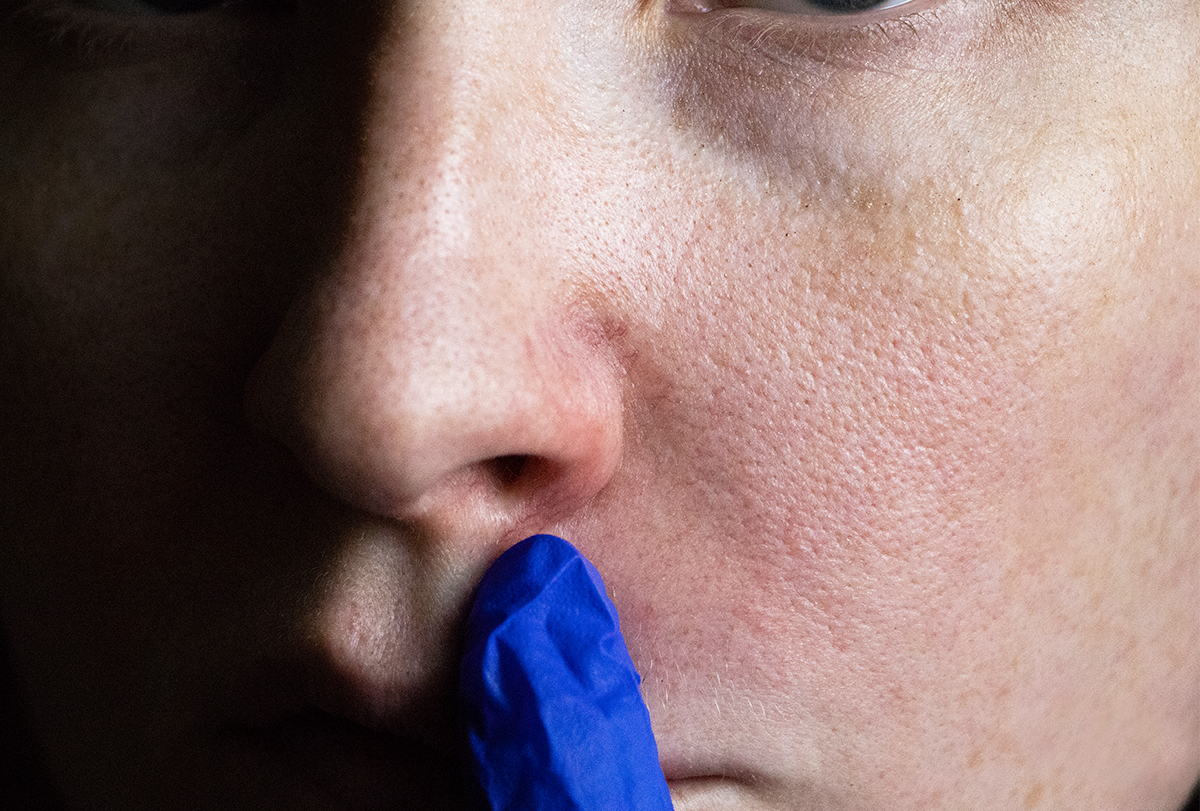
Rosacea is chronic and gets worse if left untreated. The skin inflammation associated with this condition may flare up and then subside during the initial stages but becomes persistent over time. (2)
This condition mostly affects people aged 30 to 50 years and is more prevalent in women than in men. (3)
Having red patches on the face can make you extremely self-conscious of your appearance and thereby can hamper your confidence. Low self-esteem can further jeopardize your social interactions and overall quality of life.
To save yourself the mental distress, it’s better to seek timely treatment and counseling from a specialist. Doing so is especially important as the symptoms can become progressively severe if not managed properly. (4)
Causes of Rosacea
The exact cause of this disease remains unidentified. It generally involves the dilation of the capillaries, which are the tiniest blood vessels that lie right underneath the skin. The enlarged capillaries bring a gush of blood to the tissue, making the skin look red on the surface.
Here are certain factors that are known to trigger rosacea:
- Spicy food
- Hot beverages
- Alcohol consumption
- Emotional distress
- Extreme temperatures
- Strong winds
- Sun exposure
- Excessive stress or anxiety (5)
- Harsh skin products
- Mites that carry a bacteria named Bacillus oleronius
Symptoms of Rosacea
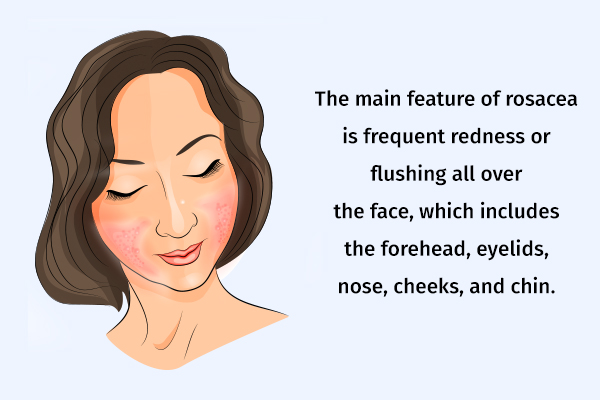
Rosacea is marked by underlying skin inflammation that physically manifests in the form of different symptoms on the surface.
The main feature of rosacea is frequent redness or flushing all over the face, which includes the forehead, eyelids, nose, cheeks, and chin. (6)(7) In some cases, the redness may spread further down to other parts of the skin.
The redness is common among all patients with rosacea, but it may also be accompanied by other symptoms that can vary from person to person. These other symptoms include:
- Skin that appears swollen, burns, and feels warm
- Sores that resemble acne lesions and discharge fluid or crust over
- Rough and dry patches of thickened skin
- Small bumps on the face, including the eyelids
- Swollen blood vessels that may become visible through the skin
- Eyes that feel dry and gritty (8)
- Swollen, red nose
Treatment for Rosacea
Rosacea is a chronic condition and therefore requires long-term treatment to keep it under control.
Your dermatologist will recommend a treatment plan based on the severity and type of your symptoms, but it usually includes the following interventions:
a. Topical treatment
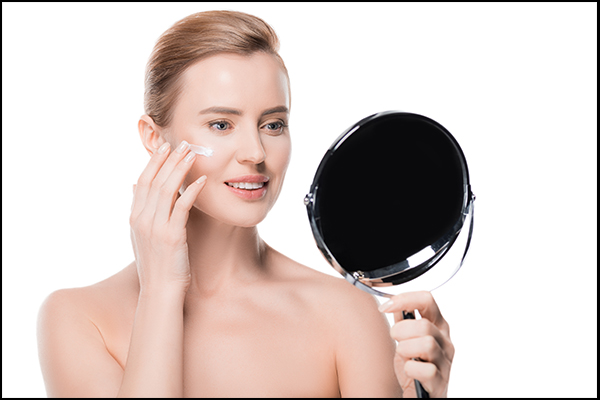
- Metronidazole creams are often recommended as the first-line treatment for rosacea. These creams are a topical antibiotic that helps curb inflammation and are particularly useful against acne rosacea, which is characterized by red, swollen, pustular lesions. When using metronidazole cream, make sure to avoid contact with your eyes, nostrils, or any mucous membrane. (9)
- Anti-redness creams bring down skin inflammation to significantly reduce the facial redness associated with rosacea.
- Azelaic acid creams can help decrease rosacea symptoms such as whiteheads, redness, acne, and blemishes. (9)
- Brimonidine gel constricts the swollen capillaries underneath the skin to reduce the overt redness, although only temporarily. (10) However, this gel can provide some much-needed relief from persistent red rashes that cover your face and is a useful aid for managing a chronic condition such as rosacea.
b. Oral medications:
- Oral antibiotics, such as doxycycline, may be prescribed to treat rosacea, especially if it triggers acne outbreaks. This medication controls the skin infection and brings down the inflammation to soothe your red, irritated skin. (11)
- Isotretinoin helps heal the pustules and blemishes brought on by rosacea by accelerating skin renewal. It also helps curb excess sebum production by shrinking the oil glands beneath your skin, which, in turn, helps prevent clogged pores that trigger acne. (12)
c. In-Office treatments
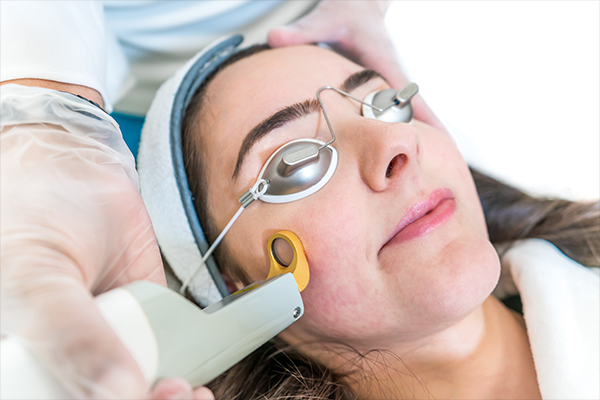
- Laser therapy uses a single, narrow, high-intensity laser beam to target the enlarged capillaries under the skin. This beam releases heat in a localized manner, which destroys the targeted blood vessels without damaging the surrounding tissue. The destroyed blood vessels are replaced by a new one. (13)
- Intense pulsed light (IPL) therapy uses many wavelengths of light rather than a single beam to reduce the redness, bumps, and visible blood vessels or capillaries on the face. It is an emerging modern treatment option for patients with rosacea. (14)
Diagnosing Rosacea
Dermatologists can diagnose rosacea by examining the rash on your face and assessing your symptoms. They may inquire about your family’s medical history.
Your doctor may run some blood tests or a skin biopsy to rule out other skin diseases before confirming the diagnosis.
Lifestyle Measures to Manage Rosacea
Implementing the following changes in your routine can go a long way in managing rosacea:
1. Follow a gentle skin care routine
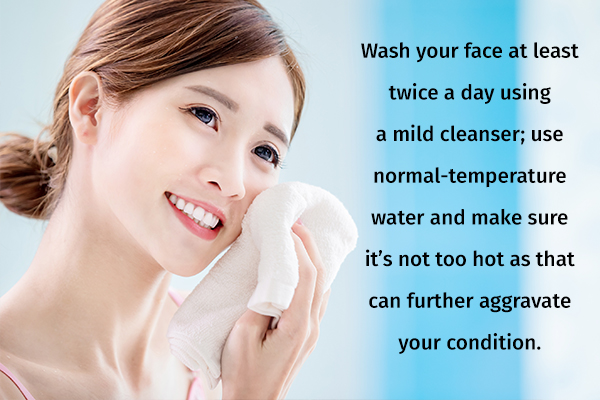
Wash your face at least twice a day using a mild cleanser; use normal-temperature water and make sure it’s not too hot as that can further aggravate your condition.
After washing, lightly pat a clean towel over your face to soak the excess moisture. Then, apply a fragrance-free moisturizer, followed by sunblock.
Given that rosacea makes your skin extra sensitive to sunlight, always apply a good-quality, broad-spectrum sunscreen with SPF 15 or higher during the day, even if you are indoors or if it’s cloudy, foggy, or rainy outside.
2. Consume a well-balanced diet
A healthy and nutritious diet can go a long way in improving your general health and boosting your immune system. Balanced nutrition can help prevent many diseases that are associated with rosacea.
Include fresh vegetables, fruits, lean protein, nuts, grains, and legumes in your everyday diet to enhance your nutritional intake. Avoid foods known to trigger rosacea flare-ups such as hot drinks, alcohol, and spicy foods.
3. Take care of your eyes
Use a gentle eyewash to clean your eyelids. Placing a warm, wet cloth over your eyes can help soothe the inflammation.
If your eyes feel dry, lubricate them with artificial tears or a doctor-prescribed eye drop. You can ask your doctor for a prescription for eye medicine or artificial tears to fight dryness.
4. Use the right kind of makeup
Green-tinted concealers are used for color correcting the skin, and they may help cancel out the noticeable redness and blemishes associated with rosacea. Always go for mineral-based cosmetics, and use a mild, unscented moisturizer as a base before applying makeup.
Note: Makeup products may cause further flare-ups in some people. Always make sure to check how your facial skin reacts to the product by doing a patch test on a small area of the face (such as the corner of your cheek).
5. Keep your mind calm
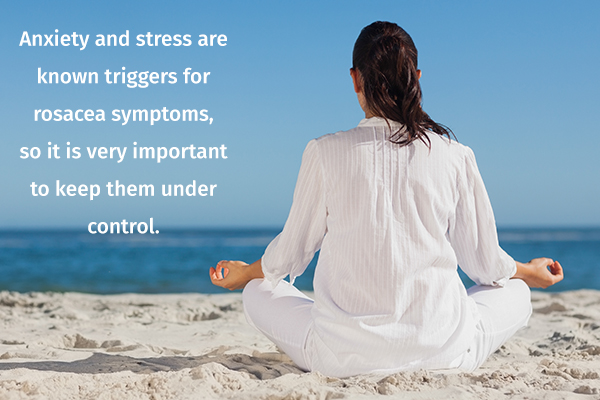
Anxiety and stress are known triggers for rosacea symptoms, so it is very important to keep them under control.
You cannot avoid stress altogether, but you can definitely manage it by adopting various relaxation techniques such as yoga, deep breathing, meditation, and tai-chi. Listen to soothing music, pursue your hobbies, get enough sleep, and exercise regularly to keep your mind in the best of state.
6. Avoid potential irritants
Most of the commercial skin products that are sold over the counter contain harsh chemicals that can irritate your skin and trigger or worsen rosacea symptoms. Steer clear of gel or acid-based cleansers and products that contain salicylic acid or benzoyl peroxide.
Tips to Help Prevent Rosacea
Rosacea may be a long-term condition, but you can prevent flare-ups by taking these steps:
1. Identify your triggers
The best way to reduce the frequency and intensity of rosacea flare-ups is to avoid the things that trigger it.
But you must first identify the triggers to be able to avoid them. You can do this by keeping a record of anything and everything that reacts adversely with your skin.
2. Protect yourself from sun exposure
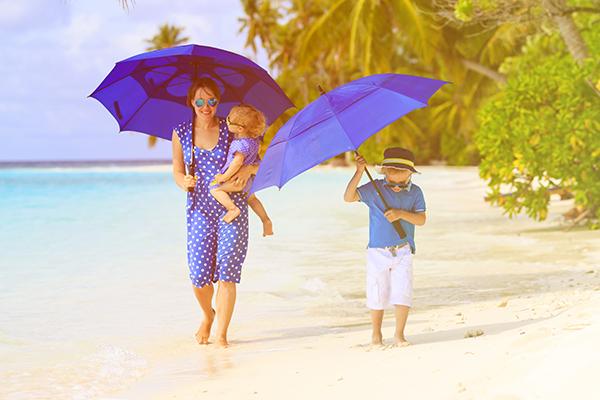
Avoid too much direct sun exposure, especially during summer. Try not to go outside during the peak hours – 10 AM to 2 PM – when the sun is at its brightest. Use an umbrella or wear a wide-brimmed hat to keep the sun out of your face.
3. Avoid alcohol
Alcohol is known to relax the blood vessels, increasing blood flow and thereby aggravating rosacea-related redness or flushing. So, it is important to minimize your alcohol intake.
Risk Factors for Rosacea
Rosacea can affect anyone, but some people are more prone to it than others. Here are a few things that can put you at an increased risk of this condition:
- Rosacea may be hereditary, which means you are more likely to develop it if you have a family history of the disease.
- Certain medications that are known to enlarge blood vessels, such as those used for treating hypertension, can make you more susceptible to rosacea.
- Light-skinned people, especially those of British or Eastern European descent, are more prone to this condition.
- People who suffer from severe or cystic acne are at a higher risk of developing rosacea. (5)
Complications Associated With Rosacea
Severe or poorly treated rosacea can lead to the following complications:
1. Rhinophyma
Rhinophyma involves the blockage of the oil glands present under your nasal skin, which then become swollen and makes your nose appear enlarged, red, and bulbous. This condition is mostly observed in male patients. (15)
2. Conjunctivitis
Conjunctivitis is an allergy or infection of the conjunctiva, the white part of the eyeball. It causes redness, watery eyes, irritation or itching, and at times an unusual discharge that may make it difficult to open your eyes. (16)
When to See a Doctor
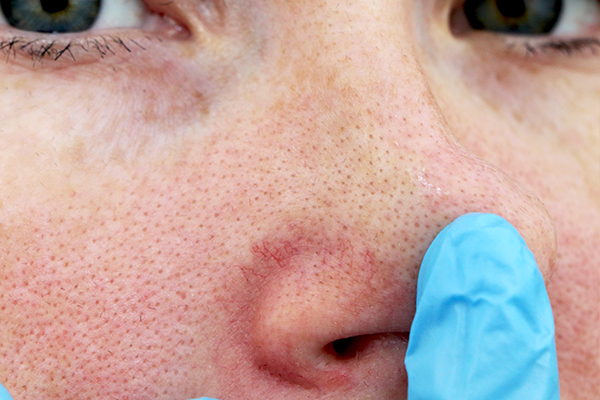
You should see your doctor:
- If your symptoms do not respond to over-the-counter treatments or get worse
- If you suffer from eye irritation or burning as this can cause serious vision problems
- If you have extreme redness on the face
Final Word
Rosacea is not a very serious condition in itself, but it may cause low self-esteem and embarrassment in patients. It is important to remember that you are more than your appearance and learn to maneuver life with a prominent, visible disease.
Identify your triggers, try to avoid them, and make some effective lifestyle changes to reduce future flare-ups. However, contact your doctor immediately if your rosacea seems to persist even after treatment or becomes painful.
- Was this article helpful?
- YES, THANKS!NOT REALLY


